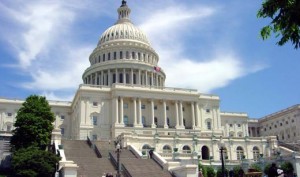 Following a post last week by Taegan Goddard, questions and serious criticism arose over whether or not Rep. Richard Hanna (R-NY) plagiarized the work of Cato fellow Julian Sanchez in a commentary the congressman wrote for the Syracuse Post-Standard.
Following a post last week by Taegan Goddard, questions and serious criticism arose over whether or not Rep. Richard Hanna (R-NY) plagiarized the work of Cato fellow Julian Sanchez in a commentary the congressman wrote for the Syracuse Post-Standard.
Of course, it's not a totally outlandish claim. In 2008, Rep. Hanna appears to have plagiarized the work of another Cato scholar, Ben Friedman. At The National Interest, Friedman wrote that it was particularly insulting because Hanna took a line to support a policy position completely the opposite of its original use. "In other words, while I dislike having my words stolen, I especially dislike having them stolen to support policy positions that they attacked," Friedman wrote. (The line, for the record, was: "The military gives us the power to conquer foreign countries, but not the power to run them." Hanna dropped "foreign.")
But that doesn't seem to be the problem with Sanchez, who tweeted, "Folks, Rep Hanna's op-ed wasn't "plagiarized"; his office adapted a summary of 3 expiring Patriot provisions w/my permission."
He also told msnbc:
My post at Cato’s blog on the three expiring Patriot Act provisions drew on a short summary I wrote up for congressional offices—Rep. Hanna’s among them—that had asked me to help pinpoint the central issues in the renewal debate. Rep. Hanna’s office asked if they could adapt that summary for an op-ed, which I happily gave them permission to do after seeing a draft of the piece (this was on the 16th, I believe). As far as I’m concerned, this is a pretty routine case of legislators adapting analysis from outside experts in explaining policy issues to their constituents.
Contrary to the insistence by some that this is an ethics issue, what these two cases show are only two points of a very complex relationship between think tanks and policy/lawmakers. (Hanna's relationship with Cato alone is perplexing enough, as Bryon Ackerman reports.)
Sometimes think tanks approach officials; sometimes officials approach think tanks. But what happens after that is almost as complicated as lawmaking itself and depends on factors involving the scholar, the think tank, the official, funders, constituents, reputations, political climate and a multitude of other considerations to reach the decision as to who gets credit for what and when.
One think tank media relations representative told Think Tanked that there are "many occasions we don't want our name on something an elected official takes on until we absolutely know it's going to be successful." Think tanks aren't always eager to have a year's worth of research adopted only to be mucked up by a lawmaker who might not get it right or only selectively use what the scholar views as a complete package.
At the same time, think tanks these days are in the business of seeing their research all the way through to implementation and many think tanks have congressional liaison staff members (or entire staffs) to make sure of it. That same media relations contact said, "It's no secret that we need funding for our work and funders are more and more concerned with measuring impact in terms of direct input in policy and lawmaking." And sometimes that means scholars "have to check their egos at the door" and realize they might not get credit for their work in order to make legislators and, by extension, funders happy.
What this seems to suggest, then, is that these instances have less to do with who gets credit for what work and have more to do with revealing the inspiration for policy and legislative decision making--it's a question of disclosure, not plagiarism.
So, in the case of Hanna, the question is not: "Did Rep. Hanna plagiarize Julian Sanchez's work?" Instead it should be: "Is it ok that Rep. Hanna didn't disclose that the basis of his commentary was from the Cato Institute and all the considerations (good, bad or otherwise) that come with it?"











Comments